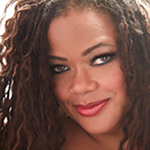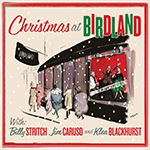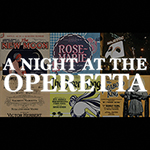Holiday Inn
Paper Mill Playhouse, Millburn, NJ, November 25, 2018
Reviewed by Chip Deffaa for Cabaret Scenes
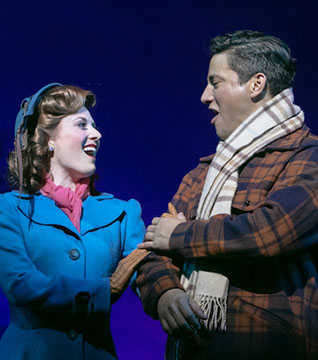
If you’re looking for a fun holiday show for the whole family, Paper Mill Playhouse’s production of Holiday Inn is warmly recommended. It’s running through December 30, and they’ve created a spirited production with a good bit of heart.
I’ve got a few reservations, which I’ll get to in a bit. But there is much to relish here. The score is rich with gems by Irving Berlin, one of the greatest of all songwriters—”Shaking the Blues Away,” “’Blue Skies,” “The Little Things in Life,” “Heat Wave,” “Easter Parade,” “Happy Holiday,” “White Christmas,”’ and more. There’s a great deal to enjoy right there.
For the most part, the production—directed by Gordon Greenberg, who co-authored the book with Chad Hodge—flows well. They’ve got a couple of excellent lead performers—Nicholas Rodriguez and Hayley Podschun—plus, wonderful Ann Harada in a featured role. And there are big, exuberant production numbers, choreographed by Denis Jones, including some of his best work to date.
I was skeptical when the Berlin estate first announced plans for a stage adaptation of the film Holiday Inn because adaptations of classic film musicals often greatly disappoint, and the original 1942 film starred two iconic performers, Bing Crosby and Fred Astaire. But there’s much to love in this musical production. Yes, there are flaws, too. But I had a good time; this is joyous musical theater, and the audience got caught up in the spirit of thing. (By chance, there was a college-age singing actor seated near me, Mike Lang, born long after these Berlin songs were written. But he was as enthusiastic about the show as anyone. The sheer showmanship of the production and the wealth of appealing Berlin melodies worked its magic.)
Paper Mill has a show with lots of appeal here. It’s a grand holiday booking. It’s well-rehearsed and executed with flair. And some of those great Berlin songs are as good as anything in the canon. (It seemed bizarre to me that Berlin, who’s responsible for most of the joys to be found here, gets a shorter bio in the Playbill than the sound designer, the lighting designer, the hair/wig designer, and others. This is his show—his songs and his concept. He created the original characters and story, and he deserves a more respectful bio.)
Costars Rodriguez and Podschun are both immensely likable—warm and human, and approachable. Wisely, they made no attempts to copy the stars who originated their characters in the famed film and managed to make the characters completely their own. And we care about them. They’re both good singers—and interesting singers—in their own right. (I’d enjoy listening to either of them on an album.) Rodriguez brings a welcome touch of vulnerability to his role and makes it easier for us to feel for his character. (Crosby was one of the all-time great vocalists—an impeccable popular singer—but he never seemed particularly vulnerable; he could be a tad aloof, distant. Rodriguez is warm and shows his feelings more; and that makes it easier for us to relate to him.) Podschun, whom I’ve seen in a number of other productions in New York and at Paper Mill, finally gets a chance to fully show what she’s capable of. She’s perfect for this role, showing an appealing mix of wholesome, small-town innocence and brass. She’s got character, she’s got strength, and she’s a first-rate singer. I liked those two lead characters a lot. Ann Harada—whom I’ve loved since the original production of Avenue Q—finds all of the comedy to be found in her supporting role, and she has great presence. She’s a strong asset. Jian Harrell, making his professional debut as the bank’s messenger boy, is wonderfully funny. Jordan Gelber was a treat as the agent.
I wasn’t that crazy about the secondary leads, Jeff Kready and Paige Faure. Kready is a solid dancer, but he has to compete with the memory of the peerless Fred Astaire, who was distinguished both as a dancer and as a song stylist and possessed great personal charm. You simply took to Astaire, even if his character seemed to be, for a moment, acting like a cad. Kready dances well and it’s thrilling to see the famed Astaire dancing-with-fireworks business “live” on stage, but he hasn’t claimed the part as his own as fully as one might have hoped. Nor has Faure. They’re fine, but not as individualistic as you might like.
https://kidneyurostonecentre.com/wp-content/languages/new/propecia.html
(In fairness, their parts aren’t as fully written as they should be. They are pretty much stock characters here.
https://kidneyurostonecentre.com/wp-content/languages/new/cymbalta.html
A show works better if we get some feel for characters as people.)
For the most part, the orchestrations by Larry Blank are excellent. And for the most part, the choreography by Denis Jones is engaging. And yet, the show isn’t quite as rewarding as it could be or should be. If I were grading it, I’d give it a fine, strong “B,” but not an “A” or an “A+” (which a top musical like Hello, Dolly! or Gypsy would warrant). I had a very good time and can warmly recommend this show. I could overlook most of its shortcomings. But they are there, and they deserve some comment.
In contrast to the original film, the pacing isn’t always quite right. The original film had a near-perfect balance of dialogue, small numbers, and big numbers. The Berlin film musicals were almost always well-paced, and often featured dialogue underscored by attractive Berlin melodies (sometimes songs sung elsewhere in the film; sometimes songs heard only as underscoring of essential dialogue scenes).
This show is stuffed—actually over-stuffed at times—with songs, at the expense of a dialogue. Sometimes it feels a bit awkward, like they’re cutting short a conversation that wasn’t fully developed so that they can hurry to an obvious song cue and sing a familiar, famous song that has been forcefully shoehorned into place. Sometimes it felt more like a parade of song hits than a musical.
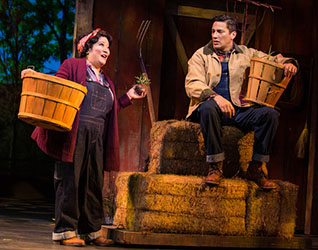
No one loves Berlin’s music more than I do. But the creators of this stage adaptation have tried to jam too many well-known songs into the show. I think that cutting a couple of the songs, and letting characters talk a bit more would both give the show a more natural feel and give it some needed moments to breathe and help us bond more with the characters. If you want to add a song to express the characters’ feelings, pick the very best songs for the scene, not just the best-known songs.
“It’s a Lovely Day Today” is a perfectly lovely song from the hit Berlin musical Call Me Madam. It belongs in that show, but it doesn’t belong in this stage adaptation of Holiday Inn. It’s highly familiar, but it doesn’t add anything here. I swear, when people do a “new” stage musical with a score made up of songs by a master like Berlin or Gershwin or Porter, they often try to cram in many of the songwriter’s best-known songs, whether they fit the show well or not. Berlin wrote over 1,200 songs, including some very good unknown ones. There are high-quality songs among them that might fit scenes much better (and provide more rewards for audience members) than overly familiar numbers like “It’s a Lovely Day Today.” But the producers need to seek out people who really know the songwriters’ catalogues, or we’ll just keep recycling the same obvious choices.
Sometimes the show simply feels like it’s trying too hard. There is much to love in the choreography—the jump-rope bit, in particular, works brilliantly. (The audience burst into applause for it.) But there are also some effects that feel strained or don’t quite work. I didn’t care for the tap-dancing-with-pails-on-the-feet; when you have a song that is pure gold, in terms of music and lyrics, a gimmick like that is only a distraction. Trust the basic material. If you have a song as great as “Shaking the Blues Away.” you don’t need to go for a cheap laugh by tap-dancing with pails on your feet. Let audiences savor the song.
Berlin picked the songs for his films carefully.
https://kidneyurostonecentre.com/wp-content/languages/new/furosemide.html
In the film of Holiday Inn, he included a great old number of his, “Lazy.” It’s not in the score of this production. A pity. It’s stronger than some of the material they’ve randomly added.
Berlin picked every note of every song with care. One note is altered, and not for the better, in “Shaking the Blues Away.” Why? Berlin was really particular about such things and hated such modifications.
The song “Easter Parade” was written to be performed with grace and ease and a lilt and works best that way. In this adaptation it winds up taking on a hard-hitting, high-pressure feel, as if the audience is going to be machine-gunned into submission. The number works but would have worked better had Berlin’s original intentions been honored more.
Don’t get me wrong. I had a very good time and there are many rewarding moments in this production—good performers doing good songs and a heartwarming story, and there are some zesty, big production numbers. The flaws don’t ruin the production. You’ll leave feeling good. It’s a big musical, attractively mounted. And the show works for all ages. I hope Paper Mill is packed. There isn’t a better holiday show in the area this year.
But this could have been a much greater musical. And that’s the pity.
I hope that other Berlin film musicals, from “Blue Skies” to “Easter Parade,” might find their way to the stage. But creating a great stage musical requires balancing all of the elements well, and that ideal balance hasn’t quite been found here.



